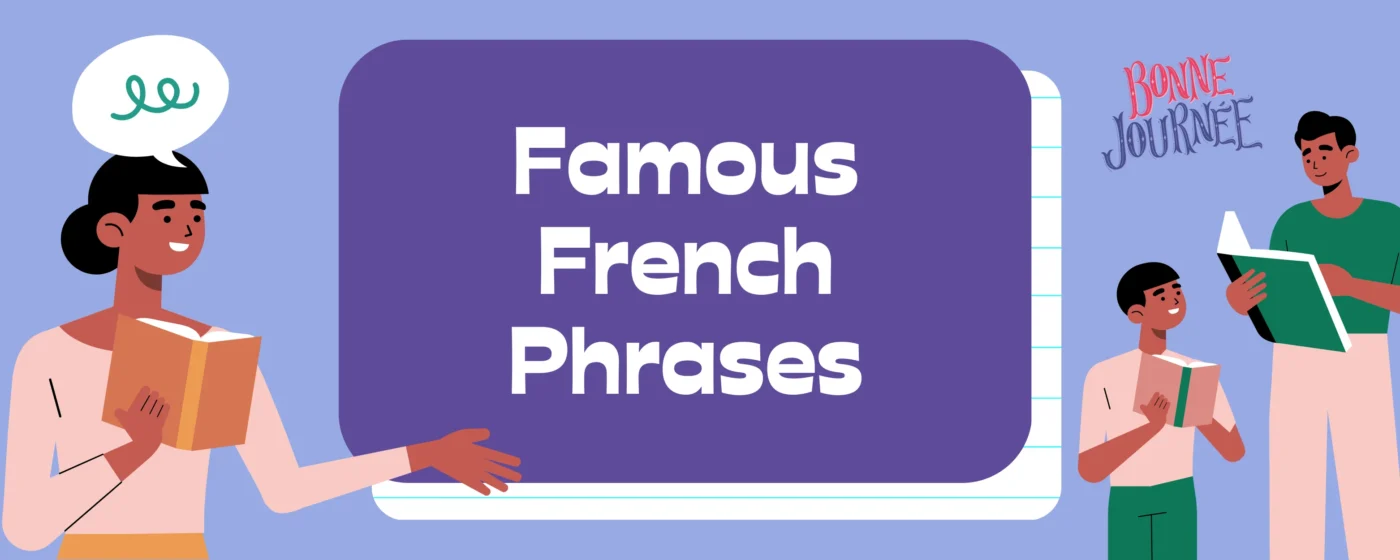Chacun voit midi à sa porte (Everyone sees noon at their door). I heard this idiom when I visited France. I was fascinated, was it about time? About doors? After searching, I found out it was about how everyone sees the world with their own eyes, their perspectives. These expressions are the glory and light of the French language.
They may seem odd and difficult to understand at first but they add spark to the sentence. Il ne faut pas se fier aux apparences (Do not judge by appearances) this phrase reflects the value, humor and thinking of French people, This phrase carry humor, emotions and cultural significance with them, and adds sparks to the sentences.
Key Takeaways
- Learn French idioms such as Chacun voit midi à sa porte teach cultural perspectives and add flair to language use.
- There are basic saying convey values like not judging by appearances or seizing the day (Carpe diem).
- Understand proverbs which enhance both spoken and written French, making you sound more such as native.
- The phrases are often carry humor and wisdom which reflect the French culture deeply.
- Using idioms in conversations or writing boosts your communication authenticity in French.
Why French Sayings Matter in Everyday Communication?
French idiomatic expressions spice up the sentences we use. When you use idioms in your day-to-day conversations like Aussitôt dit, aussitôt fait (No sooner said than done), Les murs ont des oreilles (Walls have ears) makes you sound like a native speaker rather than a textbook.
They are intrigued by French culture, values, humor etc. They help you understand like a native French speaker. English speakers often find French idioms different from their own expressions, such as using “mind your own business” instead of the literal French phrase “s’occuper de ses oignons.”
Comparing idioms across other languages can deepen your understanding of how language reflects culture. Mastering French pronunciation is important to use these expressions effectively and be understood. Learning the meaning of each French word in an idiom, as well as the word’s role in the phrase, helps you grasp the full meaning.
25 Must-Know French Phrases
Wisdom and Proverbs
1. Chacun voit midi à sa porte (Everyone sees noon at their door)
Meaning: Everyone has a different viewpoint and they see things from their perspective. Different views shape opinions.
Example Elle pense que c’est injuste, mais chacun voit midi à sa porte. (She thinks it’s unfair, but everyone sees things from their own perspective.)
2. L’habit ne fait pas le moine (The habit doesn’t make the monk)
Meaning Similar to “Don’t judge a book by its cover” in English. You shouldn’t make an opinion about someone by their appearance.
Example Il porte un costume, mais l’habit ne fait pas le moine. (He wears a suit, but appearances can be deceiving)
3. Qui n’avance pas, recule (Who does not move forward, retreats)
Meaning: They say “Change is the only constant”, you can either move forward or go backwards in life. Standing still in life is equal to regression
Example Dans la vie, il faut toujours progresser. Qui n’avance pas, recule..
4. Il ne faut pas se fier aux apparences (Do not judge by appearances)
Meaning: In English, we have “don’t judge a book by its cover”. It means we should form an opinion about someone after meeting them in person, rather than just by their way of dressing, their style
Example Elle semblait froide au début mais plus tard douce mais il ne faut pas se fier aux apparences. (She seemed cold at first but later sweet, but appearances can be misleading.)
5. Toute peine mérite salaire (Every effort deserves its reward)
Meaning: It is important to recognize the efforts of everyone. Everybody should be given equal compensation irrespective of their work.
Example Tu as bien travaillé, toute peine mérite salaire. (You worked hard, every effort deserves recognition.)
6. Vouloir, c’est pouvoir (To want is to be able)
Meaning: This proverb, “c’est pouvoir,” highlights that determination and strong desire can lead to success. It emphasizes motivation and perseverance—if you truly want something, you can achieve it through effort.
Example Si tu veux vraiment réussir, rappelle-toi que vouloir, c’est pouvoir. (If you really want to succeed, remember that to want is to be able.)
7 Comme on fait son lit, on se couche (As you make your bed, so you must lie in it)
Meaning: This saying uses “fait son lit” and “se couche” to express that your actions have consequences. It emphasizes personal responsibility: you must face the outcomes of your own decisions.
Example Il a ignoré les conseils, maintenant il doit accepter les résultats—comme on fait son lit, on se couche. (He ignored the advice, now he must accept the results—as you make your bed, so you must lie in it.)
8. L’oiseau fait son nid (The bird makes its nest)
Meaning: This proverb illustrates that, like a bird building its nest, success comes from gradual progress and perseverance. Steady effort over time leads to achievement.
Example Petit à petit, l’oiseau fait son nid. (Little by little, the bird builds its nest.)
9. Carpe diem (Seize the day)
Meaning: “Carpe diem” encourages living life to the fullest and embracing the present moment. It inspires you to enjoy life’s pleasures—eat, laugh, love, and make the most of each day.
Example N’attends pas demain pour réaliser tes rêves, carpe diem ! (Don’t wait for tomorrow to achieve your dreams, seize the day!)
If you’re starting your French learning journey, knowing greetings is essential. Our guide on Top 9 Ways to Say “Nice to Meet You in French” will help you begin confidently.
Taking Action and Decisions
1. Aussitôt dit, aussitôt fait (No sooner said than done)
Meaning: This indicates that a task will be done immediately after the request. This is commonly used in the context of offering someone a helping hand.
Example Commencez à étudier maintenant, Aussitôt dit, aussitôt fait. (Start studying now, no sooner than done)
2. Battre le fer pendant qu’il est chaud (Strike while the iron is hot)
Meaning: This expression indicates to strike the iron when the opportunity is fresh. After cooling down the iron things would not change and become unfavorable.
Example L’offre est intéressante, il faut battre le fer pendant qu’il est chaud. (The offer is good, we should act while the opportunity is hot.)
3. À jeune chasseur, il faut un vieux chien (A young hunter needs an old dog)
Meaning: A young person needs an experienced and wise person for guidance, advice, and mentoring.
Example Pour ton premier projet, tu devrais écouter ton mentor. À jeune chasseur, il faut un vieux chien. (For your first project, listen to your mentor. A young hunter needs an old dog).
4. Ce n’est pas la mer à boire (It’s not the end of the world)
Meaning: This idiom is used to reassure someone that a task is not that hard or overwhelming. When you say “ce n’est pas la mer à boire,” you mean it’s not a big deal or it’s not that difficult—ce n’est pas la chose la plus compliquée à faire.
Example Tu peux finir ce rapport ce soir, ce n’est pas la mer à boire. (You can finish this report tonight, it’s not the end of the world.)
5. Qui court deux lièvres à la fois, n’en prend aucun (Who chases two hares catches none)
Meaning: If you try to do two things at once, you risk achieving neither. It’s just like the Hindi expression “do naavon mein pair rakhna”, putting a foot in two boats means you’ll fall into the water
Context: This idiom is used to encourage focus and warn against dividing your attention or efforts between multiple pursuits. It’s especially useful when someone is trying to juggle too many tasks or ambitions at once.
Example Il veut lancer une entreprise tout en étudiant à plein temps. Qui court deux lièvres à la fois, n’en prend aucun. (He wants to start a business while studying full time. You can’t chase two rabbits at once.)
6. Il faut qu’une porte soit ouverte ou fermée (A door must be either open or closed)
Meaning : This saying emphasizes decisiveness, like a door, your choices should be clearly open or clearly closed, not halfway. You have to make a clear decision; you can’t stay in between or be indecisive.
Example : Tu dois dire ce que tu veux. Il faut qu’une porte soit ouverte ou fermée. (You need to say what you want. A door must be either open or closed.)
Lost for Words? We’ve Got You!
Sign up for our courses and let our expert teachers boost your vocabulary effortlessly!
Relationships and Interactions
1. Les bons comptes font les bons amis (Good accounts make good friends)
Meaning: It is important to keep accountability in relationships, especially when we talk about money, bills, spending etc. Transparency helps in maintaining healthy relationships.
Example On partage les frais ? Les bons comptes font les bons amis. (Shall we split the bill? Clear arrangements make for good friendships.)
2. Les murs ont des oreilles (Walls have ears)
Meaning: Always be cautious of your words, there’s always a chance that you could be overheard.
Example Chut, ne parle pas si fort, les murs ont des oreilles. (Shh.., don’t speak so loudly, walls have ears)
3. Occupe-toi de tes oignons (Mind your own onions)
Meaning: Asking someone to mind their own business and not interfere in your life.
Example Je ne t’ai pas demandé ton avis, occupe-toi de tes oignons. (I didn’t ask for your opinion, mind your own business)
4. Raconter des salades (To tell tall tales)
Meaning: This proverb is used to describe someone who is lying, exaggerating, or inventing stories. It criticizes people who spread false information or elaborate stories, especially in social interactions.
Example Arrête de raconter des salades, personne ne te croit. (Stop telling tall tales, nobody believes you.)
5. Plus ça change, plus c’est la même chose (The more things change, the more they stay the same)
Meaning : Despite apparent changes, the underlying situation or pattern remains the same. It is often used to express the disappointment, especially when changes are superficial or when history keeps repeating itself.
Example : Ils ont voté un nouveau règlement, mais rien ne change vraiment. Plus ça change, plus c’est la même chose. (They passed new rules, but nothing really changes. The more things change, the more they stay the same).
Life and Resilience
1. Un malheur ne vient jamais seul (Misfortune never comes alone)
Meaning: This indicates misfortune, followed by several bad events. This phrase is usually used to console someone having a difficult time.
Example Il a perdu son emploi et sa maison, un malheur ne vient jamais seul. (He lost his job and his home, troubles never come alone.)
2. Il n’y a pas de fumée sans feu (There’s no smoke without fire)
Meaning: Rumors are not fully irrelevant, there’s always a hint of truth in them.
Example Tout le monde parle de ce scandale… il n’y a pas de fumée sans feu. (Everyone’s talking about that scandal, there’s probably some truth to it.)
3. Ne pas faire long feu (something to not last long or to fizzle out quickly)
Meaning: It refers to something short-lived, whether it’s a plan, relationship, or enthusiasm, that fades out quickly, often due to lack of momentum.
Example Leur relation n’a pas fait long feu. (Their relationship didn’t last long.)
4. La vie est trop courte pour boire du mauvais vin (Life is too short to drink bad wine)
Meaning: Have the best time of your life, don’t bother about small things. Spend your energy on things that you enjoy doing. Make your life worth living. This saying also reflects the deep appreciation the French have for food and wine, which are central to French cuisine. French cuisine is renowned for its quality and enjoyment, and many French idioms humorously highlight the importance of good food and wine in daily life.
Example Vivre la vie pleinement, la vie est trop courte pour boire du mauvais vin. (Live life to the fullest, it’s too short to waste on bad wine.)
5. Le démon du midi (The demon of noon – midlife crisis)
Meaning: This expression indicates the midlife crises in someone’s life, especially the sudden change in behavioral patterns.
Example Il a acheté une moto à 55 ans, le démon du midi sans doute. (He bought a motorcycle at 55, probably a midlife crisis.)
If you’re starting your French learning journey, understanding greetings is essential. Our blog on 13 Ways to Say “Welcome in French” explains different expressions and their usage.
Enjoyment and Wisdom
1. Mangez bien, riez souvent, aimez beaucoup (Eat well, laugh often, love much)
Meaning: This expression is used to console someone who is having a bad day to feel positivity and happiness in their life. Living in the present is the mantra of a happy life.
Example Son mantra pour la vie est simple : mangez bien, riez souvent, aimez beaucoup. (Her motto for life is simple: eat well, laugh often, love much.)
2. À bon chat, bon rat (To a good cat, a good rat)
Meaning: Similar to the saying “tit for tat”. A strong opponent should have an equally challenging competitor.
Example Ils sont aussi malins l’un que l’autre , à bon chat, bon rat. (They’re equally clever, tit for tat.)
3. Ventre à terre (Belly to the ground – full speed ahead)
Meaning: This phrase expresses someone moving fast in an emergency or rush.
Example Il est parti ventre à terre pour attraper son train. (He left at full speed to catch his train).
4. La jeunesse est le temps d’étudier la sagesse, la vieillesse est le temps de la pratiquer (Youth is the time to learn wisdom, old age is the time to practice it)
Meaning: It’s an ultimatum to take nothing for granted in life because life is short
Example Elle passe son temps à lire, comme on dit :la jeunesse est le temps d’étudier la sagessse…. (She spends her time reading as they say, youth is the time to learn wisdom…)
5. La raison du plus fort est toujours la meilleure (The reason of the strongest is always the best)
Meaning: The powerful person often wins in an argument or discussion because of their power and authority.
Example Il a gagné juste parce qu’il a plus de pouvoir… la raison du plus fort est toujours la meilleure. (He won just because he had more power… the strongest always gets their way.)
French Phrases for Good Luck and Ability
French phrases are often used to wish others well and to express belief in their abilities. Simple yet powerful expressions like “bonne chance” (good luck) and “je te souhaite tout le meilleur” (I wish you all the best) are perfect for offering encouragement and support. When you want to boost someone’s confidence, phrases such as “tu es capable” (you are capable) can make a big difference. The famous saying “impossible n’est pas français” (nothing is impossible) embodies the French spirit of resilience and determination, inspiring you to overcome obstacles and strive for success. By incorporating these French phrases into your interactions, you not only show your positive attitude but also motivate yourself and others to reach new heights, making every challenge an opportunity to grow and succeed.
Enhance your language skills by exploring essential Makeup Vocabulary in French. This guide helps learners understand everyday beauty terms in French, perfect for conversations and cultural knowledge.
Tips for Using French Phrase in Real-Life Situations
These French expressions in real-life situations can make your conversations more authentic and realistic. You can start with simple phrases in casual conversations then move to emails, or traveling. Try using these idioms in your day-to-day life with native speakers, friends or peers. Listening to podcasts can also help you to grasp the correct context and usage.
At La Forêt French Class, learners are motivated to confidently use such expressions in their daily conversations, with interactive sessions and conversation practice. These expressions build your confidence in your language journey.





